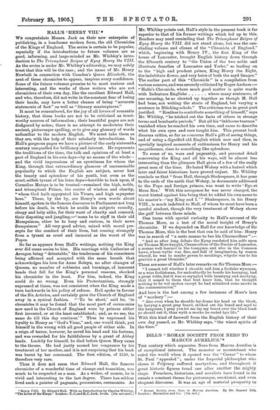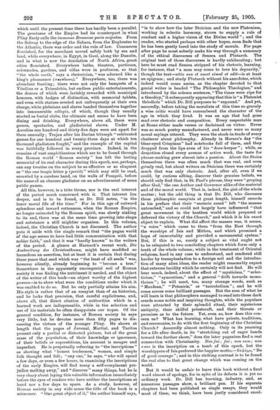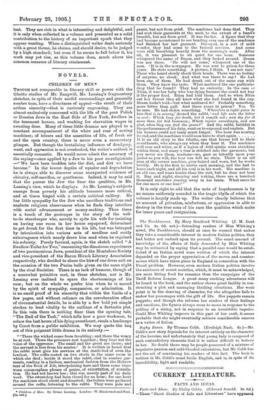DILL'S " ROMAN SOCIETY FROM NERO TO MARCUS AURELIUS."*
THE century which separates Nero from Marcus Aurelius is of exceptional interest. The monster or mountebank who ruled the world when it opened was the " Caesar " to whom St. Paul " appealed " ; under the Imperial philosopher who closes it Polycarp suffered martyrdom, and throughout it great historic figures tread one after another the mighty stage. Preachers, historians, and novelists have found in its annals a constant theme for picturesque, emotional, and even eloquent discourse. It was an age of material prosperity to • Roman Society from Nero to Marcus dartlitts. By Dr. Samuel London : Macmillan and Co. [15s. net.]
which until the present time there has hardly been a parallel. The greatness of the Empire bad its counterpart in what Pliny finely calls the immensa Romans pads majestas. From the Solway to the edge of the Sahara, from the Euphrates to the Atlantic, there was order and the rule of law. Commerce flourished, for the merchant moved safely both by sea and land, while everywhere, in Egypt, in Gaul, along the Danube, and in what is now the desolation of North Africa, great cities flourished. Everywhere baths, theatres, porticoes, colonnades, gardens, and villas were in profusion, so that "the whole earth," says a rhetorician, "was adorned like a king's pleasaunce (wapiagafq)." Everywhere, too, there was abundant feasting ; there were not only the banquets of a Vitellius or a Trimalchio, but endless public entertainments, the donors of which were lavishly, rewarded with municipal honours, with badges of distinction, with memorial tablets, and even with statues erected not unfrequently at their own charge, while plebeians and slaves banded themselves together into innumerable collegia, of which, though they usually started as burial clubs, the ultimate end seems to have been dining and drinking. Everywhere, above all, there were games, spectacles, and gladiatorial shows. Under M. Aurelius one hundred and thirty-five days were set apart for them annually ; Trajan after his Dacian triumph " celebrated games for one hundred and twenty-three days at which ten thousand gladiators fought," and the example of the capital was faithfully followed in every province. Indeed, in the remains of vast amphitheatres which are to be found through the Roman world " Roman society " has left the lasting memorial of its real character during this epoch, nor, perhaps, can any treatise on the subject be so effective or so eloquent as "the one tragic letter p (periit)" which may still be read, scrawled by a careless hand, on the walls of Pompeii, before the name of an obscure gladiator on an advertisement of some public games.
All this, however, is a trite theme, nor is the real interest of the period much concerned with it. That interest lies deeper, and is to be found, as Dr. Dill notes, "in the inner moral life of the time." For in this age of outward splendour and inward rottenness, when the Roman Empire, no longer animated by the Roman spirit, was slowly sinking to its end, there was at the same time growing into shape and substance a still mightier organism. In this volume, indeed, the Christian Church is not discussed. The author puts it aside with the single remark that "the pagan world of the age seems to have had little communication with that nobler faith," and that it was "hardly known" to the writers of the period. A glance at Harnack's recent work, Die Ausbreitung des Christenthums, might have modified so hazardous an assertion, but at least it is certain that during these years that seed which was " the least of all seeds " was, however silently, already beginning to " become a tree."
Somewhere in the apparently uncongenial soil of Roman society it was finding the nutriment it needed, and the object of the writer of this book—an object worthy of the highest powers—is to show what were the conditions under which it was enabled to do so. But he only partially attains his aim. His style is rather that of an essayist than of an historian, and he lacks that precision, that careful explicitness, and, above all, that direct citation of authorities which in a learned work are indispensable, while in the selection and use of his materials he often disappoints our hopes. Of the general condition, for instance, of Roman society he says very little, but he devotes more than fifty pages to dis- cussing the virtues of the younger Pliny. He shows at length that the pages of Juvenal, Martial, and Tacitus present only a partial or distorted picture, but of the great mass of the population, of their knowledge or ignorance, of their beliefs or superstitions, his account is meagre and imperfect. He is perpetually referring to "the inscriptions"
as showing what "honest tradesmen," women, and simple folk thought and felt ; " any one," he says, " who will spend a few days, or even a few hours, in examining the inscriptions of the early Empire, will find many a self-complacent pre- judice melting away," and "discover" many things, but he is
very chary about laying this valuable information immediately before the eyes of readers who have neither the inscriptions at hand nor a few days to spare. As a study, however, of Roman society in any wide sense the title of the book is a misnomer. " One great object of it," the author himself says,
"is to show how the liter Stoicism and the new Platonism, working in eclectic harmony, strove to supply a rule of conduct and a higher vision of the Divine world " ; and the reader, who started perhaps with other hopes, soon finds that he has been gently lured into the study of morals. For page after page he must soberly make his way through a summary of the ethical discourses of Seneca and Plutarch. The original text of those discourses is hardly exhilarating ; but here be must read Seneca stripped of his rhetoric, learning, for instance, that " a man may come to love his depravity," though the text—tit/a sun et amat simul et odit—is at least an epigram ; and study Plutarch without his anecdotes, which indeed would come amiss, as the chapter devoted to that genial writer is headed " The Philosophic Theologian," and introduced by the solemn sentence, " The times were ripe for a theodicy," it subsequently appearing that this is " a Platonist theodicee " which Dr. Dill purposes to "expound." And yet, assuredly, before taking the moralists of this time so gravely a wise critic would have remembered the character of the age in which they lived. It was an age that bad gone mad over rhetoric and composition. Every respectable man at Rome either made verses or declaimed on virtue. Never was so much poetry manufactured, and never were so many moral sayings uttered. They were the stock-in-trade of every chatterer about philosophy. Already in Horace's day "the
• blear-eyed Crispinus" had notebooks full of them, and they dropped from the lips even of his " door-keeper " ; while, as despotism closed every avenue of active work, the taste for phrase-making grew almost into a passion. About the Stoics themselves there was often much that was real, and even grimly real, but about writers on Stoicism there was certainly much that was only rhetoric. And, after all, even if we could, by curious sifting, discover their genuine beliefs, we should only find that, in St. Paul's phrase, they were " groping after God," the one Author and Governor alike of the material and of the moral world. That is, indeed, the gist of the whole matter ; but the odd thing is that Dr. Dill, who discusses these philosophic essayists at great length, himself records in his preface that their "esoteric creed" left "the masses untouched," and so could not largely have influenced " that great movement in the heathen world which prepared or deferred the victory of the Church," and which it is his exact object to explain. What did affect the masses was, it seems, "a voice" which came to them "from the East through the worships of Isis and Mithra, and which promised a hope of immortality and provided a sacramental system." But, if this is so, surely a subject so vital ought not to be relegated to two concluding chapters which form only a tenth of the whole volume; while in the treatment of Oriental religions, hard in any case to understand, and rendered still harder by transplantation to a foreign soil and the introduc- tion of many alien ideas, the reader might reasonably expect that extreme lucidity which he certainly will not find. He will hear much, indeed, about the effect of " mysticism," " eclec- ticism," " syncretism," and a general " drift towards mono- theism"; he will meet, too, many strange words, such as " lliazdean," " Petosiris," or " taurobolium "; and he will come across some brilliant passages. But the sum of what he will learn is that philosophers managed to read into these dark creeds some noble and inspiring thoughts, while the populace were attracted by their splendid ritual, their mysterious antiquity, their skilful priestcraft, and their threats or promises as to the future. Yet, even so, how does this con- cern us P What has learning, what have priests, traditions, and ceremonies, to do with the first beginning of the Christian Church P Assuredly almost nothing. Only in its yearning for a life after death, in its "stretching out of eager hands toward the further shore," does the later paganism find a real connection with Christianity. Non fui ; fui ; non sum ; non curo is the inscription on a tomb of this epoch, but the worshippers of Isis preferred the happier motto,—E4t;zsg, " Be of good courage " ; and in this striking contrast is to be found the real clue to that great change which was coming on the world.
But it would be unfair to leave this book without a final word almost of apology, for in spite of its defects it is yet no ordinary work. Dr. Dill has learning, industry, and, as numerous passages show, a brilliant pen. If his separate chapters had been published as single essays, they would most of them, we think, have been justly considered excel- lent. They are rich in what is interesting and delightful, and it is only when collected in a volume and presented as a solid contribution to the history of an important epoch that they appear wanting. When a distinguished writer deals seriously with a great theme, he claims, and should desire, to be judged by a high standard; but even if he seems to fall below it, his work may yet rise, as this volume does, much above the common measure of literary attainment.








































 Previous page
Previous page